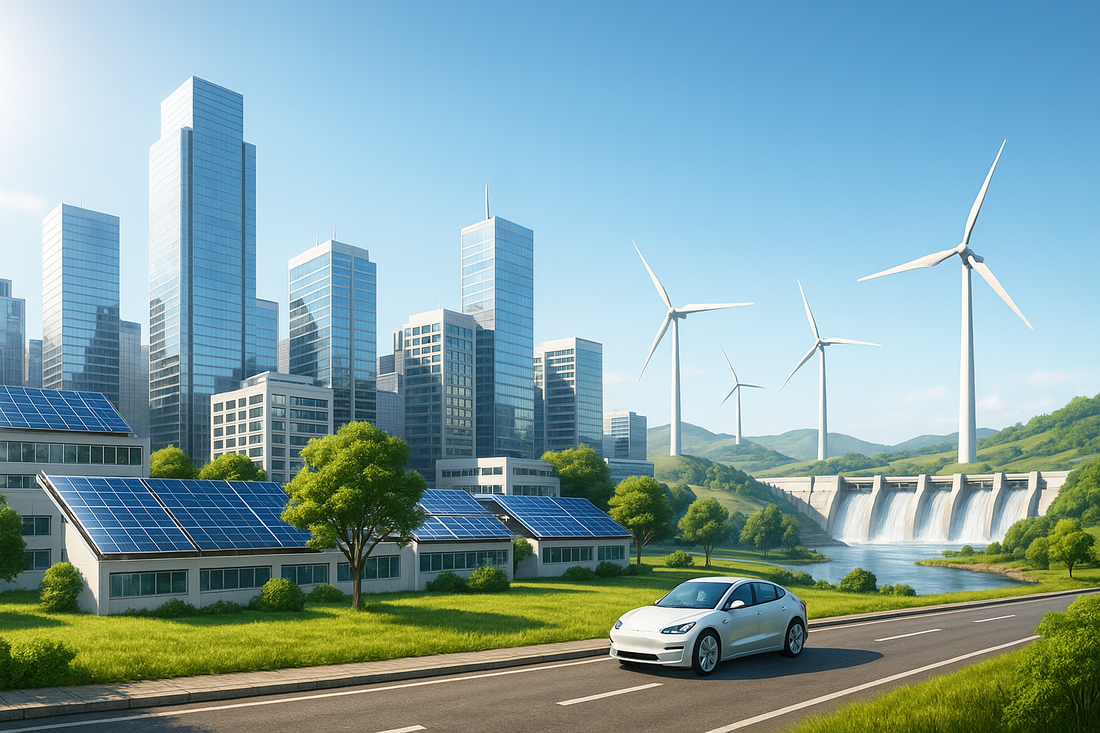
Top 7 Benefits of Renewable Energy for the Future
Share
Top 7 Benefits of Renewable Energy for the Future
As the world grapples with the pressing challenges of climate change and dwindling non-renewable resources, the focus on renewable energy has never been more critical. Renewable energy offers a pathway to a sustainable and secure energy future, providing clean and abundant energy sources that are vital for our planet's well-being. This article explores the top seven benefits of renewable energy, delving into how these energy sources are reshaping our energy systems and addressing global energy needs.
Understanding Renewable Energy
Definition of Renewable Energy
Renewable energy is derived from natural sources that replenish more quickly than they are consumed, offering a sustainable solution to the world's energy challenges. Unlike fossil fuels, which are finite and take millions of years to form, renewable energy sources such as solar and wind are abundant and readily available. These sources harness the power of nature to generate clean energy, providing a renewable and sustainable alternative to traditional energy systems. By tapping into these renewable resources, we can significantly reduce our reliance on non-renewable energy and mitigate the environmental impacts associated with fossil fuels.
Types of Renewable Energy Sources
There are several types of renewable energy sources that play a pivotal role in the energy transition. Here is a list of some of the key renewable energy sources:
- Solar Panel energy, harnessed through photovoltaic cells, is the most abundant source of renewable power, capturing sunlight to generate electrical energy.
- Wind energy, generated by large turbines turning with the movement of air, is another key renewable energy source.
- Hydropower utilizes the flow of water from rivers or stored reservoirs to produce energy.
- Geothermal energy, derived from the Earth's internal heat, and bioenergy, produced from organic materials like biomass, further diversify the renewable energy landscape.
Together, these renewable technologies offer a comprehensive suite of energy solutions to meet global energy consumption.
Importance of Renewable Energy
The importance of renewable energy in today's world cannot be overstated. As countries strive to reach Net Zero goals, the transition from fossil fuels to renewable energy sources is imperative. This shift is crucial for energy security and sustainability, particularly in regions like the US and Europe. Renewable energy technologies are essential in addressing the climate crisis, reducing carbon emissions, and ensuring a stable energy supply amidst global disruptions. The recent geopolitical tensions, such as the Russian-Ukraine conflict, have further accelerated the adoption of renewable energy, highlighting the need for domestic energy generation. By investing in renewable energy systems, nations can strengthen their energy sector and support a cleaner, more resilient future.
Benefits of Renewable Energy
1. Energy Security
Energy security is a paramount benefit of renewable energy, significantly enhancing the stability and resilience of the energy supply. By diversifying energy sources through the integration of renewable resources like solar and wind, countries can reduce their dependence on imported fossil fuels, thereby insulating themselves from geopolitical tensions and market fluctuations. This shift to renewable energy sources provides a more reliable and sustainable energy system, fostering energy independence and stability. As renewable energy technologies advance, the ability to store and distribute energy efficiently further strengthens energy security, ensuring a continuous energy supply even during peak demand periods or natural disruptions.
2. Environmental Impact
Renewable energy offers profound environmental benefits, primarily through the reduction of greenhouse gas emissions and pollution. Unlike traditional fossil fuels, renewable energy generation produces minimal carbon emissions, playing a crucial role in combating climate change. Clean energy sources such as solar and wind contribute to a significant decrease in air and water pollution, preserving ecosystems and public health. By harnessing renewable resources, we can significantly reduce the environmental footprint of energy production, promoting a cleaner and more sustainable energy future. The transition to renewable energy is vital for achieving international climate goals and ensuring the health of our planet for future generations.
3. Economic Benefits
The economic benefits of renewable energy are substantial, driving innovation, creating jobs, and stimulating economic growth. The renewable energy sector is a rapidly expanding industry, with investments in renewable power and energy technologies leading to the creation of millions of jobs worldwide in areas such as manufacturing, installation, and maintenance. As renewable energy systems become more cost-effective, they reduce energy costs for consumers and businesses, enhancing economic stability. Additionally, the energy transition to renewable sources fosters local economic development, as communities invest in renewable energy projects and benefit from increased energy independence. This transition supports a resilient and sustainable economy while providing long-term economic opportunities.
Renewable Energy Technologies
Advancements in Energy Storage
Energy storage technologies are pivotal in enhancing the efficiency and reliability of renewable energy systems. Innovations in battery storage, such as lithium-ion batteries, are set to revolutionize the energy sector by enabling the storage of energy generated from renewable sources like solar and wind.
| Technology | Features |
|---|---|
| Flow Batteries | Store energy in liquid electrolytes; cost-effective alternatives |
| Sodium-ion Batteries | Offer cost-effective alternatives |
As the demand for clean energy grows, electricity storage is projected to skyrocket from 176 GW today to over 14,000 GW by 2050, significantly optimizing the energy system. Additionally, pumped hydroelectric storage, a well-established technology, remains a cornerstone, making up over 90% of all installed capacity worldwide, while innovative solutions like compressed air and gravity storage are emerging as promising alternatives.
Innovative Renewable Power Solutions
The renewable energy industry is witnessing groundbreaking innovations that enhance the integration and efficiency of renewable power solutions. Some significant advancements in solar energy deployment include:
- Integrated photovoltaic (PV) systems, floatovoltaics, and agrivoltaics, which maximize land use and increase energy generation.
- The development of thin-film solar cells, which are lightweight, flexible, and environmentally friendly, revolutionizing the solar energy landscape.
Meanwhile, technologies that concentrate solar power using mirrors and lenses are improving photovoltaic performance. Other advancements such as AI-enhanced grid management and next-generation battery storage are complementing untapped water energy sources, including tidal and wave energy, providing diverse energy solutions. Multi-day storage technologies like flow batteries and thermal storage are emerging to address the need for extended energy storage, ensuring a stable and sustainable energy supply.
Integration of Clean Energy Technologies
The integration of clean energy technologies is crucial for capturing and utilizing excess electricity generated by renewable energy sources. Energy storage systems play an essential role in this process, storing surplus energy produced during periods of high renewable energy generation and releasing it when demand peaks. This capability is fundamental to achieving a balanced and reliable energy system, particularly as renewable sources are expected to supply nearly half of all electricity by 2050. Common storage technologies, including batteries, pumped hydro, and thermal systems, facilitate the seamless movement of electricity through time, ensuring a consistent energy supply. By enhancing the integration of renewable resources into the grid, these technologies contribute to the overall resilience and sustainability of the energy sector, supporting a cleaner, more efficient energy future.
Impact on the Energy Industry
Shifts in Energy Demand
The global shift towards renewable energy sources is driving significant changes in energy demand patterns. As renewable power technologies become more widespread, the demand for conventional fossil fuels is decreasing. The rise of solar energy and wind energy, in particular, is altering the landscape of energy consumption. With the benefits of renewable energy becoming more apparent, annual renewable capacity additions are projected to reach a record 460 GW by 2027, with the potential to hit almost 600 GW under accelerated scenarios. According to the International Energy Agency, renewable energy will account for more than 90% of global electricity capacity expansion from 2022-2027, signaling a remarkable shift in the energy sector.
Energy Independence through Renewable Sources
The transition to renewable energy sources is pivotal for achieving energy independence. By harnessing renewable and sustainable energy technologies, countries can reduce their reliance on imported energy, promoting energy security and sustainability. Renewable energy generation allows for local production of power, diminishing the need for foreign energy resources and fostering self-sufficiency. This shift is particularly crucial for the U.S., where increasing the share of renewable energy in the national energy mix can enhance energy independence and contribute to a more resilient energy system. As nations continue to invest in renewable energy systems, the path towards energy self-sufficiency becomes clearer, offering a sustainable solution to global energy challenges.
Future Trends in the Renewable Energy Industry
The future of the renewable energy industry is marked by continuous growth and innovation. The International Energy Agency forecasts that renewables will surpass coal as the largest source of global electricity generation by early 2025, highlighting the shift towards clean energy. The global battery storage market is also expected to more than double by 2030, reaching up to $150 billion, underscoring the importance of energy storage technologies in supporting renewable energy solutions. In the U.S., large-scale battery storage is anticipated to expand dramatically, from 1 GW in 2019 to 98 GW by 2030. These trends indicate a robust trajectory for the renewable energy sector, driven by technological advancements and the increasing demand for sustainable energy solutions.
Conclusion: The Future of Renewable Energy
Summary of the 7 Benefits
Renewable energy offers a multitude of benefits that are crucial for a sustainable energy future. The top seven benefits of renewable energy include enhanced energy security, significant environmental impact, and economic advantages. Renewable energy sources help reduce dependency on fossil fuels, leading to a more stable and resilient energy supply. They contribute to a cleaner environment by minimizing greenhouse gas emissions and pollution. Additionally, the renewable energy sector drives economic growth through job creation and technological innovation. Together, these benefits highlight the transformative potential of renewable energy in addressing global energy needs and combating climate change.
The Path Forward for Clean Energy
As the global community recognizes the critical role of renewable energy, nations are increasingly implementing policies to support clean energy development. Countries like China, India, the U.S., and the EU are leading the charge, strengthening initiatives that promote the adoption of renewable technologies. This commitment to renewable energy is essential for achieving climate goals and ensuring a sustainable energy future. As renewable energy systems continue to evolve, they offer a pathway to a cleaner, more resilient energy sector. By prioritizing investments in renewable energy resources, nations can enhance their energy security, reduce carbon emissions, and foster economic growth.
Call to Action for Sustainable Energy Use
Now is a pivotal moment for embracing cleaner, greener, and more sustainable energy sources. The growing deployment of renewable energy technologies is vital for combating climate change, reducing global temperatures, and protecting our planet. As individuals and communities, we must advocate for and support the transition to renewable energy systems. By investing in renewable energy generation and adopting sustainable energy practices, we can contribute to a more sustainable energy future. This collective effort is crucial for safeguarding the environment and ensuring the well-being of future generations. The time to act is now, as we work together to build a cleaner, more sustainable world.
